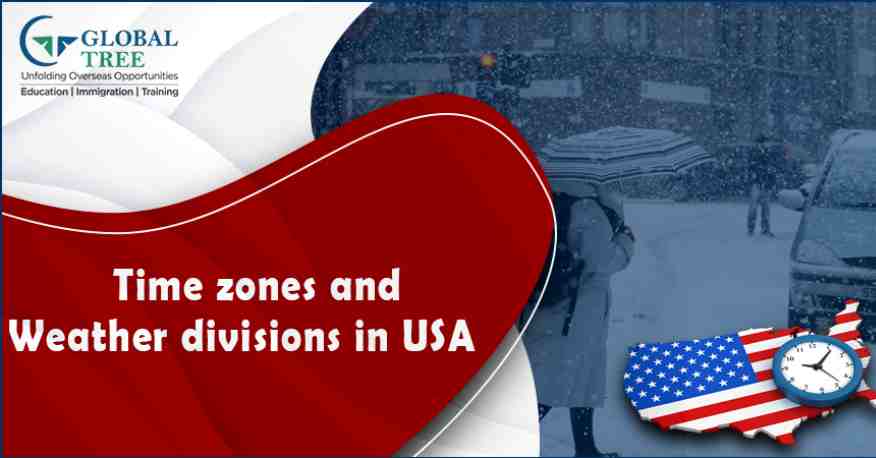Time Zones & Weather Divisions in the USA

Time Zones in the USA
Learning about time zones is very useful for students planning to study in the United States. Knowledge of the time zones will help you adjust to the time difference. If you know what time zone, you're in, you can adjust your training and sleeping schedule to fit in with the time zone of the state you are planning to study in.
Time Zones:
A time zone is a region that is one of the 24 spherical lunes, or equal-width sections of the globe in the north-south direction, each with one of the 24 hours allotted, that adheres to a common standard time for social, commercial, and legal purposes.
USA Time Zones:
-
Hawaii-Aleutian Time (HAT)
-
Alaska Time (AST)
- Pacific Time (PT)
- Mountain Time (MT)
- Central Time (CT)
- Eastern Time (ET)
Hawaii-Aleutian Standard Time – HAST (UTC-10)
Hawaii-Aleutian Daylight Time – HADT (UTC-9)
Alaska Standard Time – AKST (UTC-9)
Alaska Daylight Time – AKDT (UTC-8)
Pacific Standard Time – PST (UTC-8)
Pacific Daylight Time – PDT (UTC-7)
Mountain Standard Time – MST (UTC-7)
Mountain Daylight Time – MDT (UTC-6)
Central Standard Time – CST (UTC-6)
Central Daylight Time – CDT (UTC-5)
Eastern Standard Time – EST (UTC-5)
Eastern Daylight Time – EDT (UTC-4)
[Also Read: Total Cost of studying in the USA]
| Time Zone | Abbreviation | States | GMT = 12.00 pm |
|---|---|---|---|
|
Eastern Standard Time |
EST |
Connecticut, Delaware Georgia, Maine, Maryland, Massachusetts, Michigan, New Hampshire, New Jersey, New York, North Carolina, Ohio, Pennsylvania, Rhode Island, South Carolina, Vermont, Virginia, Washington DC, West Virginia |
7:00 AM |
|
Central Standard Time |
CST |
Alabama, Arkansas, Illinois, Iowa, Louisiana, Michigan (Upper Peninsula), Minnesota, Mississippi, Missouri, Nebraska, Oklahoma, Wisconsin |
6:00 AM |
|
Mountain Standard Time |
MST |
Arizona, Colorado, Montana, New Mexico, Utah, Wyoming |
5:00 AM |
|
Pacific Standard Time |
PST |
California, Nevada, Washington |
4:00 AM |
|
Alaska Standard Time |
AKST |
Main part of Alaska (Anchorage, Juneau, Nome) |
3:00 AM |
|
Yukon Standard Time |
YST |
||
|
Alaska-Hawaii Standard Time |
AHST |
Aleutian Islands (west of Alaska), Hawaii |
2:00 AM |
The below states lie in two time zones:
| Time Zone | States |
|---|---|
|
Eastern Standard Time and Central Standard Time |
Florida, Indiana, Kentucky, Tennessee |
|
Central Standard Time and Mountain Standard Time |
Kansas, Nebraska, North Dakota, South Dakota, Texas |
|
Mountain Standard Time and Pacific Standard Time |
Idaho, Oregon |
The U.S. Weather Divisions
Based on the CONUS, there are 344 climate divisions in the US (Continental US). The monthly station temperature and precipitation data for each climatic division are calculated from the daily readings. To calculate state-wide values, the divisional values are weighted by region, and state-wide values are weighted by region to compute regional values.
The Northeast, Southwest, West, Southeast, and Midwest comprise the United States’ five areas. The climate in the USA varies greatly by region. Three distinct climate types—desert, mountainous alpine, and coastal Mediterranean—could be used to further categorize the region. Summers are scorchingly hot and arid in all three of these places so, pack your bags for the flight accordingly.
Major Climate Zones in the USA:
- Tropical zone from 0°–23.5° (between the tropics)
- Subtropics from 23.5°–40°
- Temperate zone from 40°–60°
- Cold zone from 60°–90°
Major Climate Regions in the U.S.:
- Polar Chill. Polar climates are very cold and dry throughout the year.
- Temperate Regions
- Arid Zones
- Damp Tropical Regions
- The Mild Mediterranean
- The Cold Tundra
[Also Read: Eligibility Requirements to Study in the USA]
List of states in the U.S. having the best weather conditions:
- California
- Hawaii
- Texas
- Arizona
- Florida
- Georgia
- South Carolina
- Delaware
- North Carolina
- Louisiana



 964 260 9000
964 260 9000